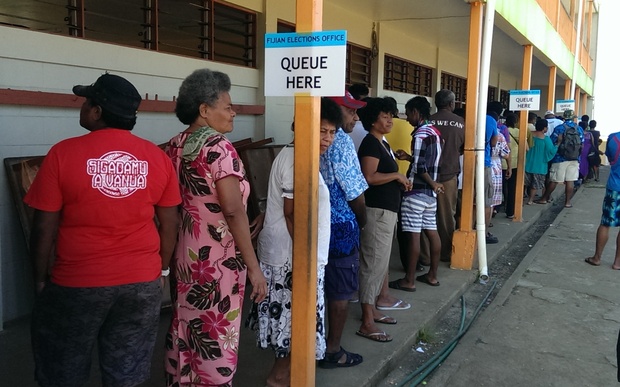 |
| Voting in 2014 pn162 |
Campaigning Heats Up for Fiji Election
By Sally Round on Radio NZ International (With my emphases and Notes)
HOPE, Unity and the Labour Party are the other parties fielding candidates for the 51 seat parliament. (Note 3)
FijiFirst has been rallying voters with its "family fun days" where, amid bright blue bunting, T-shirted leaders push the party message of stability, equality and the ability to keep on delivering economic growth .
The party has painted its opponents as shambolic, racist and liars who are intent on taking Fiji back to dark days of the past.
The NFP leader Biman Prasad said the incumbent government was lashing out at him and his party in desperation, for fear of losing power.
He said FijiFirst leaders are the ones raising the race card, a hot button issue in multi-ethnic Fiji.
The NFP is pledging a fair living wage, zero sales tax on basic food items, and higher cane payments for struggling farmers in the backbone sugar industry.
The slogan of the Social Democratic Liberal Party (SODELPA) is "leadership that listens", focusing on unity and consultation as it tries to dispel perceptions that it only represents Fiji's indigenous people.
The slogan of the Social Democratic Liberal Party (SODELPA) is "leadership that listens", focusing on unity and consultation as it tries to dispel perceptions that it only represents Fiji's indigenous people.
Its leader Sitiveni Rabuka, fresh from his acquittal on Friday of charges of electoral fraud, presented the party's manifesto to the Vanua Levu town of Labasa on Saturday.
Anti-corruption authorities wasted no time in appealing and Mr Rabuka could yet be convicted which would see him out of the race.
Unity Fiji led by the former Fiji Reserve Bank Governor Savenaca Narube has put forward its manifesto, entitled a "Roadmap to Peace and Happiness".
Among its aims is to "heal the wounds of the past" including addressing "the injustices of the 1987, 2000, and 2006 coups".
Tupou Draunidalo, who jumped ship from the NFP to set up the HOPE party, is fielding a strongly female line-up of candidates, offering an up to four fold increase in the minimum wage, sector by sector, and in consultation with industry.
------------------
------------------
Notes
1. With no details provided, readers might think that Bainimarama changed the system to ensure his re-election. The replaced constitution was race-based and varied electorate sizes favoured the Taukei (ethnic Fijian) and disadvantaged Indo-Fijians and urban Taukei. The new system has no race bias and each vote has equal weight.
2. Despite efforts to widen ethnic representation, SODELPA is essentially a Taukei party led by chiefs, similar to the party overthrown in the 2006 Coup. The National Federation party has most support among Indo-Fijians. According to polls, FijiFirst has majority support from all ethnic groups.
3. Polls also indicate that of the minor parties, only HOPE has an outside chance of winning a parliamentary seat.
--ACW
No comments:
Post a Comment